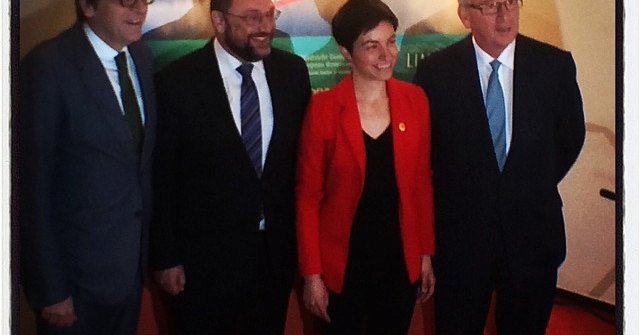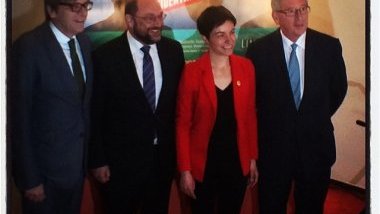A democratic success
Despite a few uncertainties, this debate was an important democratic success. Euronews skilfully overcame the linguistic hurdle, by proposing a simultaneous translation of high quality in 13 languages of the Union. This allowed for an important rate of citizen participation, notably through Internet. The hash tag #EUdebate2014 was one of the most popular ones on Twitter, as no less than 10,000 tweets/minute were published by Internet users! These tweets came from across Europe, although with a clear majority from Southern Europe.
This debate was perhaps the founding act of European democracy. Indeed, not a single candidate envisaged the possibility that the Council of the European Union (which brings together Heads of Nation-States), disregarding citizens’ vote, could propose a non-candidate for President of the European Commission. This is only a first step, which is non-negligible, to transform the European Commission into a government that is responsible before the European Parliament.
We do lament the fact that candidates had so little time to express their views and show the differences that exist between party programmes. However, this debate will have allowed putting names and faces to political parties which are unfortunately only the aggregation of national parties. Candidates were able to display their personality and determination to build a genuine project for the future of Europe.
The exchange of views focused on three key topics, each discussed during half an hour: the economy, Euroskepticism and foreign policy. Although all candidates agreed with each other on Euroskepticism, the priorities and orientations offered for the European Union were distinct. The debate on how to deal with Russia in the Ukrainian crisis distinguished two clear positions, one in favour of dialogue and the other in favour of targeted sanctions. All agreed on the necessity for Europe to be strong and united in order to remain influential in international relations. On the Transatlantic Free-Trade Agreement (TAFTA) currently being negotiated, opinions were more clearly split, between a strong refusal (Ska Keller), a more measured opposition (Martin Schulz, Guy Verhostadt) or merely recognising the lack of trust arising from the NSA-spying scandal in late 2013 (Jean-Claude Juncker).
The debate took time to find its rhythm, with initially very little time left for candidates to answer questions, but remained interesting until the very end without losing intensity, a notable achievement. Internet users’ reactions in particular provided this sensation that for the first time we were living a genuinely European moment, and just for that it was a clear success.
Time for public broadcasting channels to wake up?
Despite all this, no broadcasting on public TV was programmed. In France, public channel France 2 already provided a clear idea of where they stand by cancelling a debate with Martin Schulz following a specific demand by extreme-right leader Marine Le Pen – who argued the debate needed to be 100% French. In the end, it is the Eurovision that will be displayed on May 10th rather than the main European Commission candidates’ debate on May 15th.
Whilst we are experiencing an unprecedented confidence crisis; whilst for the first time political parties accepted to play the democratic game; whilst European citizens display a clear interest for the European debate, the French broadcasting channel (but also that of other countries such as the United Kingdom) refuses to display the next debate.
The success of yesterday’s debate should convince our broadcasting channels to provide citizens with the debate they need in order to choose knowledgeably their candidate in the upcoming elections.


Follow the comments: |
|
